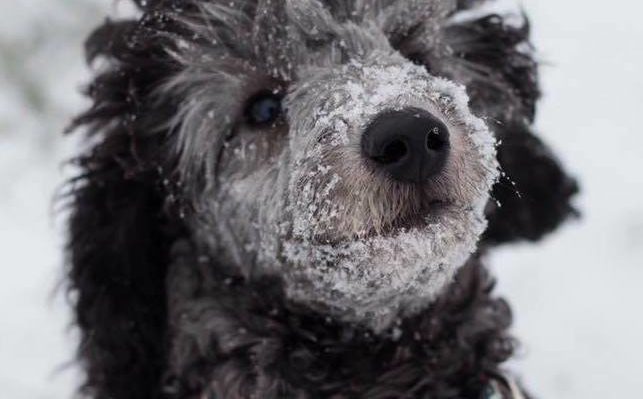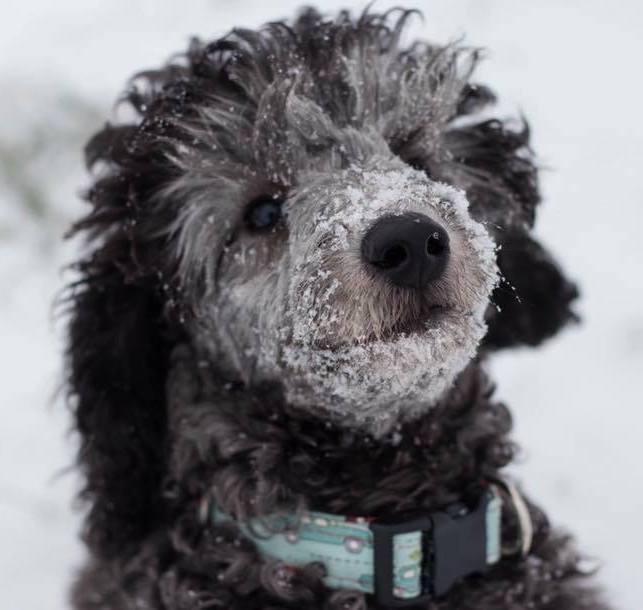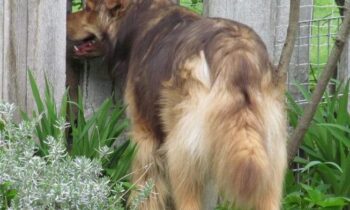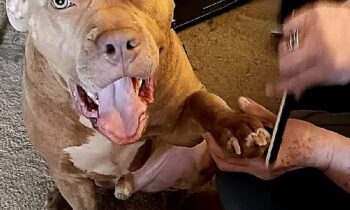
What’s the grooming task second most likely to be neglected by a novice dog owner? Teeth!
Overall, dog professionals (including trainers, groomers, and veterinarians) agree that doggy dental care is an extremely important component of a dog’s general well-being. That’s right; your dog’s teeth and your care for them can affect the dog’s health, happiness, and longevity—even his behavior!
It’s not news that teeth are important to a dog. I think what’s changed in the last few decades is how much the care of those teeth has improved for the average pet dog. My veterinarian talked to me about keeping my dogs’ teeth clean over 30 years ago, when he gave me a scaler and showed me how to use it. I don’t remember the first time I saw doggy toothpaste or those wonderful little “over-your-thumb” alternatives to a toothbrush, but I do know that when I’d talk with first-time dog owners about doggy dental hygiene even 20 years ago, very few of them had seriously considered daily brushing their dog’s teeth.
Now many breeders and fosterers start dental care on puppies within the first weeks after birth, beginning the gentle handling and treatment the pups will get for the rest of their lives. Puppies learn from infancy that having gentle human hands around their mouths and gentle human fingers on their gums can be rewarding—very rewarding! Early on, they learn to accept the daily care of their mouths and teeth the same way they learn to accept humans caring for their paws, their nails, their ears, their eyes, their fur—for any part of them.
Learning to accept care is a very important component of their upbringing!

Photo by Keely Sims
Families who adopt a puppy from a reputable breeder or rescue organization may have a head start on their new dog’s dental health. Their first vet visit, for puppy vaccinations and a “well-puppy” checkup, often includes a gift pack with information and instruction on doggy dental care, as well as a toothbrush or other device and a small sample of toothpaste for dogs. (Yes, it might be meat-flavored!) Veterinarians encourage first-time dog owners to keep up what the puppy raisers began: regular doggy dental care, starting immediately, on those little puppy teeth.
Dogs adopted after puppyhood—and dogs of any age that didn’t have puppy raisers who concentrated on giving them daily good experiences with handling their mouths and teeth—are at somewhat of a disadvantage. Their owners must play catch-up in teaching those dogs that having their mouths and teeth touched can be rewarding . . . so it’s important to start as soon as possible and to make the habit very rewarding. (In other words, you don’t grab your newly adopted dog and force his mouth open so you can brush his teeth! But you knew that.)
Your new dog may not have had any bad experiences with humans handling his mouth or any part of him. Yay! That means your job is much easier than it would be if the dog had a history of unpleasant handling or, worse, discomfort or pain associated with humans near his mouth. A dog with no preconceived notions about your hands in his mouth is a much easier assignment. And your job is to give the dog all sorts of pleasant experiences that pair your hands with his mouth.
You probably can guess that peanut butter’s involved, can’t you?
Bite Inhibition
Only if your dog likes peanut butter, of course. But, yes, a good start on dental care is introducing your dog to licking peanut butter off your fingers. If, that is, you’ve already worked on bite inhibition.
If you haven’t worked on bite inhibition (not biting down on human skin or clothing), the peanut butter may help eventually, but first you should take a few steps to make sure your dog does not intentionally or unintentionally close his teeth down on your fingers.
You don’t know how to teach bite inhibition? Contact a force-free, fear-free dog trainer with an excellent reputation. Ask your veterinarian for a referral. Or sign up for a force-free, fear-free family dog class (not formal competition obedience training) for beginners, specifying that you want instruction on bite inhibition and taking treats gently, and also some coaching on dental care.
Don’t wait until you or a family member—a child or an elder—gets hurt. Teaching your dog bite inhibition is a critical task and you must start the day you bring the dog home—but not without help! Don’t test the dog to see what makes him bite, and then decide what to do. Get the professional help you need from day one.
Sign up for a visit from a trainer before the dog comes home, start in a class before you get the dog. Yes, most experienced instructors will welcome you without a dog; they wish all of their clients could have some training before they get a dog!
You’ll be very glad you know what to do and how to do it when your new family member arrives!
Veterinary Dental Care
What if you are unable or unwilling to brush your dog’s teeth every day (this could be true for any number of reasons), but you are able, willing, and eager to keep his teeth and gums as healthy as possible?
Talk with your veterinarian. Explain the situation and schedule an initial dental exam. (Inform your veterinarian if your dog is anxious, fearful, or aggressive about handling of any kind, of course.) Once your veterinarian completes the exam, he or she can advise you on the best choices for treatment given your dog’s health at the moment. Most important, you will have an ally in your fight to keep your dog’s teeth and gums as healthy as possible. Your veterinarian can tell you how often treatment is needed and give you an estimate of that treatment’s cost. Pet insurance may cover some, none, or all of your expenses, depending on your policy.
Regular dental exams and recommended treatments at the veterinary clinic may seem expensive, but choosing not to treat dental issues in dogs can cause a much higher likelihood of serious health (and behavioral) issues that will rack up far larger bills to keep your dog alive.
Periodontal disease is the most common clinical condition in cats and dogs, even though it’s completely preventable. Dental health affects overall health in dogs much as it does in humans. Poor dental health can affect the dog adversely now and in the future.
Dr. Cindy Charlier, board-certified veterinary dentist, explains what periodontal disease is and how we can prevent our pets from getting it.
https://www.youtube.com/watch?v=j6gNkXpRZkE
As your dog’s guardian and caretaker, your job is to do as much as you can to prevent tooth and gum problems for the rest of his life. Daily tooth-brushing at home is an excellent start. Dental exams every six months and treatments recommended by your veterinarian are next. Before you buy pet insurance, check policies carefully to see if dental care is included and what treatment is covered.
Expense is an issue for many of us, so here’s some good news: in the United States, February is National Pet Dental Health Month, which means discounts on dental care for cats and dogs at many veterinary clinics across the country!
https://www.avma.org/Events/pethealth/Pages/February-is-National-Pet-Dental-Health-Month.aspx



